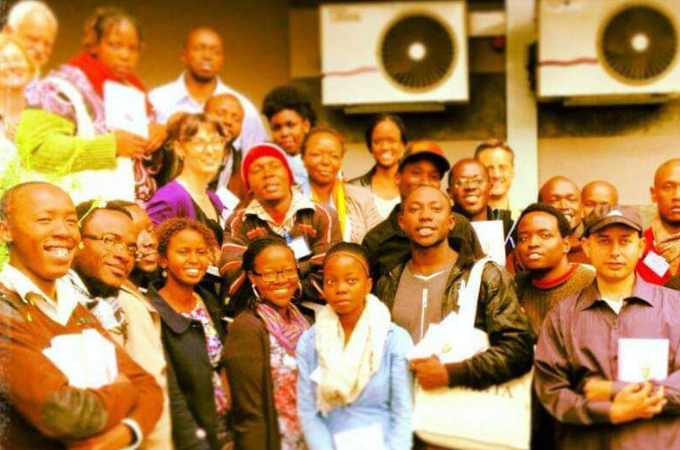
One of my favorite pictures of my peers was taken beneath two massive air conditioning units . The edges are edited to look like a polaroid and two unfortunate straps of blurriness run across its top and bottom. Yet, gathered in this image are dreamers and thinkers and future Africa39 honorees, novelists, poets and winners of countless accolades. It was June 2013, and each stood in their individual, undeniable brilliance. But, with the encouragement of Okwiri Oduor, Tuelo Gabonewe and Novuyo Tshuma, they decided to create something together: Jalada Africa.
Sifting through old emails, it was wonderful to revisit the roots of the burgeoning Collective. There was Anne Moraa, our first Managing Editor, extending the submission deadline for Jalada 00 on account of the 2013 Westgate attack; Mehul Gohil sparking a 46-part email chain with the sentence “She did it.” when Okwiri’s Caine Prize win was announced; Richard Oduor taking over our social media accounts (a role that would span three years and yield a successful digital footprint) and Kate Hampton asking for feedback on a logo designed to evoke the pencils that were common in primary school when Collective members were growing up.
I learnt that Richard Ali’s emails had always arrived with wit, enthusiasm, and free lessons in pidgin and that Clifton Gachagua played an important role in developing Jalada’s aesthetics far beyond his role as poetry editor. But this was also a place for Abdul Adan, Alex Ikawah, Nyana Kakoma, Moses Kilolo, Kiprop Kimutai, Mukami Kunga, Idza Luhumyo, Mwas Mahugu, Linda Musita, Wambui Wairua and Zak Waweru to work and play. This pan-African tribe shared links to MFA programs, scholarship opportunities, jokes and newspaper articles. Folks traded gossip, fiercely debated, revealed fears and laughed together. And when our first issue came out, it was ushered into the world with determination and gusto. In the interviews conducted soon after, Jalada Africa had such clarity regarding itself.
Who were we? ‘Collective’, for us, describes a mode of organizing our artistic and intellectual labour as well as our material resources along principles of collaboration, solidarity (mutual care and support), and anti-hierarchy.
What did we strive for? The common thread through all this is that Jalada can (and will) allow African writers to have a space that is their own: the freedom to write without boundaries, without doubts (is it African enough? Is it political enough? Can you really say that?), and with support from a team whose only demand is quality.
This energy was infectious. With each new issue, the number of published stories increased—as did our membership, with Aleya Kassam, Ndinda Kioko, Donald Molosi and myself joining. The themes we explored, first insanity, then sex, afrofuture(s) and language, were playful, complex and audacious. The works in these anthologies were accompanied by digital mixed media panels of text and visual art nearly always designed by Marziya Mohammedali. The end result was a series of anthologies that broke with prevailing conventions on what African literature could be and placed us within the literary zeitgeist.
We became a port of call for well-established authors and artists but, more importantly, countless first-timers received guidance from Jalada’s in-house arts and editorial teams. The latter remains central to the Collective’s publishing ethos. After all, we started out as a space to read and critique each other’s work in order to improve it.
As the years rolled on, we took on two distinct personas: the Collective and the digital publisher. The first was driven by the seeds of a friendship captured in sepia tones, and it was equal parts joyous and tempestuous. The second was our public-facing self that was taking on more and more responsibility.
By 2015, we’d appointed a Board of Trustees consisting of leading figures in Africa’s literary landscape, namely: Leila Aboulela, Ellah Wakatama (OBE, Hon, FRSL), Yvonne Adhiambo Owuor, Jekwu Ozoemene and Stephen Partington. A few years later, we adopted the Jalada Charter to govern our twin identities. Along the way, we collaborated with several literary and cultural organizations from across the globe, including Wrivitism, Transition Magazine and the Edinburgh International Book Festival, building friendships and creating exciting projects together.
Our homegrown ideas outside the traditional journal have been just as groundbreaking. In 2015, we launched the translation series. Conceptualized and led by former Managing Editor, Moses Kilolo, Issue 01 featured a fable by Prof. Ngugi wa Thiong’o and currently reads in 94 languages, a record in the history of the modern short story. It has been our great joy to witness these disparate languages—many of which are African and rarely exist in written form outside the Bible—in dialogue with each other through a shared literary text. Each re-rendering of the original story revealed the inherent complexities and inventiveness of our languages.
In 2017, we hit the road with the Jalada Mobile Literary & Arts Festival, a hybrid between a traditional place-based festival and a literary/art bus tour. The goal was to celebrate cultural diversity through conversations, multilingual performances and exhibitions. Co-curated by Moses Kilolo, Richard Oduor and myself, the 28-day trip covered over 4,500 kilometers and had over 7,000 total attendees.
The festival featured panel discussions, creative writing and translation masterclasses, poetry workshops, performances, art installations, and historical excursions in towns spread across 5 countries: Kenya (Nairobi, Kisumu, Nakuru, Mombasa), Uganda (Kampala, Kabale), Democratic Republic of Congo (Goma), Rwanda (Kigali, Musanze), and Tanzania (Mwanza, Arusha, Dar es Salaam, Zanzibar), plus a presentation at London’s Africa Writes Festival.
We also implemented The Jalada Book Caravan, an idea put forward by Richard Oduor, which was a collaboration between authors, publishers, wholesalers, retailers, and readers, to find new solutions to the myriad technical, marketing and distribution challenges in the continent. This involved book sales, school visits, workshops and donations to libraries.
Today, Jalada Africa has grown to be more than the sum of its fantastic parts. It has evolved, conquered and survived. Our members are as diverse as they are variously talented, and we’ve introduced a new Spotlight series to showcase this accomplished cast. We are proud of our place within the pantheon of literary publishing and our devotion remains ever with our community of authors, readers and supporters. We make something astounding whenever we think and create together.
Seven years since that image was taken, we are the volunteer-run, pan-African writers’ collective and digital publisher that could. We decide anthology themes and leaders democratically and operate across multiple time zones. Despite life’s ever-growing pressures, we have churned out 15 stellar anthologies and projects.
How did we get here? The spark was a three-day workshop organized by Kwani Trust and the British Council as part of Granta’s ‘Best of Young British Novelists 4’ tour. It was led by the glorious Ellah Wakatama who served as a mentor alongside Adam Foulds, Billy Kahora and Nadifa Mohammed.
Then, 22 writers from Kenya, Uganda, Nigeria, Zimbabwe, Botswana and South Africa dared to imagine something new. Okwiri said it best in her acceptance speech for the 2014 Caine Prize:
I am very hopeful about this thing—this shape-shifting, colorful, incredible thing—that we call African literature. Whatever it is; it eludes definition perhaps, and I like it that way because it is as diverse and as beautiful as each one of us.



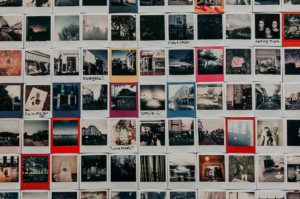

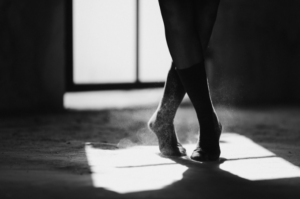
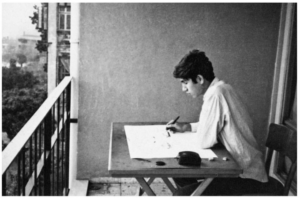
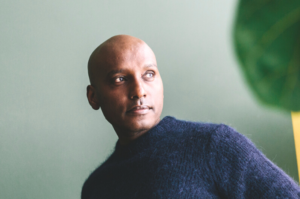

Han March 26, 2021 02:18
A shame and disgrace to completely erase the work put in by one of the most vocal champions and drivers of jalada's initial efforts Nick Ochiel